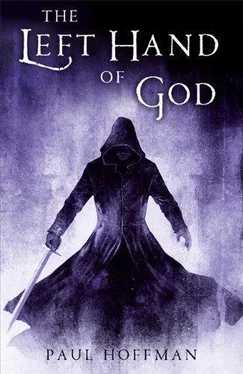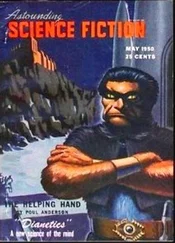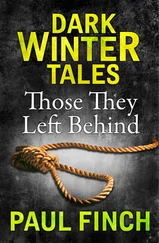On they moved through the traders’ incomprehensible cries, “Widdee, Widdee, Wee!” called out a man who seemed to be selling bright pink cow tails from a casket, shaved of skin and the color of candy floss. “Etchy-Gudda-Munda,” shouted another, displaying his vegetables with a hand swept out with all the smugness of a magician who had just made them appear from thin air. “Buyee myah vegetables ah! Rhyup tommies. Deliciosa pinnapules. Buy ah my herbage, my gorgheous botany.”
Some stalls were on sites filling half an acre-and on one corner an old man, half-naked, held out a ragged cloth, trying to sell the two speckled eggs it contained and hopping from foot to foot.
Gawping around to his left, Vague Henri saw a train of boys of around nine years, linked by chain round their necks, being led toward a gate watched over by huge men in leather jackets, who nodded them through. The boys seemed unconcerned, but what truly alarmed Vague Henri was that the lips of the boys were painted red and their eyelids powdered in a delicate blue.
Vague Henri called over to one of the soldiers next to him. He nodded at the boys and the building through the gate, gaudily painted and even more crowded than the market.
“What’s going on there?”
The solider looked at the boys and his face paled over with disgust.
“That’s Kitty Town. Never go there.” He paused and looked sadly at Vague Henri. “Not if you have a choice.”
“Why is it called Kitty Town?”
“Because it’s run by Kitty the Hare. And so you don’t ask any more questions, he ain’t no woman and he ain’t no hare. Stay away.”
As they entered past the guards into the city of Memphis proper, the change was instant: from the crush and noise and smell of the market into the deep cool of the tunnel. Within thirty yards of near darkness under the walls they were out in the light again. And then again it was another world. Unlike the Sanctuary, where brownness and uniformity made everywhere look like everywhere else, in the citadel there was endless variety: a palace with spiky copper minarets blooming with green stood next to a manor house of yellow and purple brick. There were tailor-perfect boulevards with trees whose trunks were painted white with chalk, and leading off them warped and ancient lanes so narrow even a cat would think twice before entering. Hardly anyone looked at the boys: it was as if they were not so much ignored as unseen. Except by the younger children, who ogled them from behind the delicate iron railings of the garden squares, all curls and golden hair.
Then there was a burst of activity from one of the roads above them, and twenty household cavalry in red and gold uniforms clattered into the square escorting a decorated carriage. They headed urgently toward the caravan and pulled up around the covered wagon in which Lord Vipond lay unconscious. The carriage opened its two wide doors and three important-looking men rushed toward the wagon and disappeared inside. The boys all stood for five minutes and waited in the cool breeze and the shadows of the trees that lined the square.
A small girl, perhaps five years old, walked unseen by her gossiping mother up to the rail nearest the three acolytes.
“Hey, you, boy.”
Cale looked at her with all the considerable unfriendliness he could muster.
“Yes, boy, you.”
“What?” said Cale.
“You have a face like a pig.”
“Go away.”
“Where have you come from, boy?”
He looked at her again.
“From hell, to take you away in the night and eat you.”
She considered this for a moment.
“You look like an ordinary boy to me. A dirty, ordinary boy.”
“Looks can be deceiving,” said Cale. By this time Kleist was interested.
“You’ll see,” he said to the little girl. “Three nights from now we’re going to break into your room, but very quiet-like so your mother can’t hear. And then we’ll put a gag in your mouth and then we’ll probably eat you there and then. And then all we’ll leave behind is some bones.”
Her confidence in their ordinariness seemed to waver. But she was not a girl to be easily frightened.
“My dada will stop you and kill you dead.”
“No, he won’t, because we’ll eat him too. Probably first, so you’ll know what’s coming.”
Cale laughed aloud at this and shook his head at Kleist’s pleasure in the exchange.
“Stop encouraging her,” he said, smiling. “She looks like a snitch to me.”
“I am not a snitch!” said the little girl indignantly.
“You don’t even know what a snitch is,” said Kleist.
“Yes, I do.”
“Quiet!” whispered Cale.
The girl’s mother had finally missed her and was hurrying over to her.
“Come away, Jemima.”
“I was just talking to the dirty boys.”
“Be quiet, bold girl! You mustn’t talk about these unfortunate creatures like that. I’m sorry,” she said to the boys. “Apologize now, Jemima.”
“I won’t.”
She started to drag her away. “Then there will be no pudding for you!”
“What about us?” Kleist called. “What about pudding for us?”
Now there was movement ahead, and six household soldiers were lifting down Chancellor Vipond while the three men looked on with worried faces. He was taken to the carriage and carefully lifted inside. Within a minute the carriage had left the square, and the caravan moved on slowly behind.
Three hours later they were inside the last keep, had been taken down to the cells, stripped, searched and had three buckets of freezing water thrown at them, smelling of unpleasant chemicals unfamiliar to them. Then they’d been given back their clothes, dusted in itchy white powder and locked in a cell. They sat in silence for thirty minutes until Kleist gave a sigh and said, “Whose idea was this? Oh yes, Cale’s. I forgot.”
“The difference between here and the Sanctuary,” replied Cale, as if barely interested enough to reply, “is that here we don’t know what’s going to happen. If we were back there we would, and it would involve a lot of screaming.” It was hard to argue with this, and within a few minutes they were all asleep.
For three days Lord Vipond drifted closer and closer to death. Many were the balms and medicines given to him, the aromatic herbs burned day and night; tinctures of this and that were smoothed on his wounds. Each one of these treatments was either useless or positively harmful and only Vipond’s natural vigor and good health pulled him through, despite the best efforts of the finest physicians Memphis could provide. Just when his heirs had been told to prepare for the worst (or, from their point of view, the best), Vipond woke up and croakingly demanded that the windows be opened, the noxious herbs removed and his body washed in boiled water.
In a few days, no longer deprived of cool fresh air and with his natural defenses able to do their work, he was sitting up and giving an account of the events that led to him being buried up to his neck in the sandy grit of the Scablands.
“We were about four days from Memphis when we were hit by a sandstorm, though it was more gravel than sand. That was what scattered the caravan, and before we could regroup Gurriers attacked us. They killed everyone as they stood-but for some reason they decided to leave me as you found me.”
The man he was speaking to was Captain Albin, head of the Materazzi’s secret service-a tall man with the blue eyes of a young girl. This striking feature was in great contrast to the rest of his appearance, which was precise (he looked as if he had just been ironed) and cool.
“You’re sure,” asked Albin, “that it was just Gurriers?”
“I’m not an expert on bandits, Captain, but that was what Pardee told me before he died. Do you have any reason to think otherwise?”
Читать дальше











